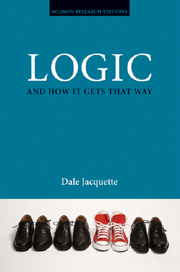Book contents
- Frontmatter
- Contents
- Preface
- Introduction: Logic, philosophy, analysis
- 1 Logical form
- 2 Monkey raisins
- 3 The secret life of truth-functions
- 4 Reference and identity
- 5 Intensional versus extensional logic and semantics
- 6 Truth
- 7 Logical and semantic paradoxes
- Conclusion: Moral lessons of logic
- Notes
- References
- Index
7 - Logical and semantic paradoxes
- Frontmatter
- Contents
- Preface
- Introduction: Logic, philosophy, analysis
- 1 Logical form
- 2 Monkey raisins
- 3 The secret life of truth-functions
- 4 Reference and identity
- 5 Intensional versus extensional logic and semantics
- 6 Truth
- 7 Logical and semantic paradoxes
- Conclusion: Moral lessons of logic
- Notes
- References
- Index
Summary
WHY PARADOXES MATTERA
A paradox nags and gnaws at our peace of mind. Confronted with a particularly diabolical paradox, we may experience an acute intellectual pulling and twisting in opposite directions as we struggle to make sense of a situation that we had previously assumed was unproblematic. When a paradox impinges we realize that we cannot simply have everything we want, or at least not as cheaply and easily as we had supposed in our former innocence. Paradoxes limit concepts in an especially striking way, unless we are obtuse to their impact, requiring us to rethink cherished positions as we try to negotiate passage through an unexpectedly complex conceptual terrain.
Quine, in his essay, “The Ways of Paradox”, distinguishes between paradoxes and antinomies. By this partition of conundrum types, a paradox is merely something surprising and unanticipated, whereas an antinomy is an outright logical contradiction or syntactical inconsistency. The so-called barber's paradox, by Quine's definition, citing his own example, counts only as a paradox rather than an antinomy. We may not have realized, reflecting superficially only on the words, that there cannot possibly be a barber who shaves all and only those persons who do not shave themselves. A para-doxa, tracing the meaning of the term to its Greek roots, is literally something that is beyond belief. It may startle us to learn that there can be no such barber; yet the proposition does not imply a logical contradiction or antinomy of the form p ∧ ┐p.
Information
- Type
- Chapter
- Information
- Logic and How it Gets That Way , pp. 178 - 264Publisher: Acumen PublishingPrint publication year: 2010
